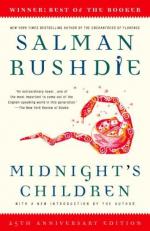|
This section contains 6,162 words (approx. 21 pages at 300 words per page) |

|
SOURCE: Merivale, Patricia. “Saleem Fathered by Oskar: Intertextual Strategies in Midnight's Children and The Tin Drum.” ARIEL: A Review of International English Literature 21, no. 3 (July 1990): 7-21.
In the following essay, Merivale investigates the influence of Günter Grass's The Tin Drum on Midnight's Children.
Salman Rushdie's Midnight's Children (1981) is characterized throughout by a “translation,” as flamboyant as it is skilful, of themes, topoi, events, characters, images, and above all rhetorical and metaphorical strategies from “western” fictions—of which Gabriel García Márquez's One Hundred Years of Solitude (1967) and Günter Grass's The Tin Drum (1959) are the two most significant—into the “Indian” terms of Rushdie's own narrative. “Magic Realism” is a shorthand term for many of these strategies: Midnight's Children owes its “magic,” one could say, to García Márquez and its “realism” to Günter Grass, even though such a formulation smacks of that somewhat...
|
This section contains 6,162 words (approx. 21 pages at 300 words per page) |

|


